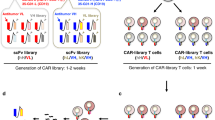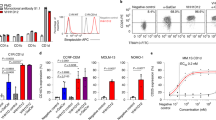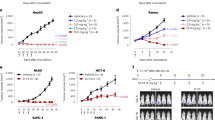Abstract
The biological property of an antibody is determined by its antigen binding characteristics and its isotype-related effector functions. We have established monoclonal antibodies of different isotypes by stepwise selection and cloning of the hybridoma CE7. The original CE7 secretes an IgG1/kappa (CE7 gamma 1) antibody that recognises a 185 kD cell surface glycoprotein expressed on all human sympatho-adrenomedullary cells. Isotype-switch variants were isolated in the following sequence: from the original CE7 gamma 1, CE7 gamma 2b variants were isolated, and from a CE7 gamma 2b variant CE7 gamma 2a variants were isolated. The antibodies of three different isotype variant cell lines possess identical antigen binding characteristics, but display distinct effector functions as demonstrated by antibody dependent cell-mediated cytotoxicity (ADCC). ADCC was performed with the neuroblastoma line IMR-32 as the target cells, and different FcR gamma positive cells were either freshly isolated from human peripheral blood leukocytes or cultured for 6-10 days and tested as potential effector cells. Tumour lysis mediated by monocyte-derived macrophages depended on the presence of CE7 gamma 2a antibodies; antibodies from the CE7 hybridomas of gamma 2b and gamma 1 isotypes were virtually inactive in ADCC assay. Pre-exposure of macrophages to rIFN-gamma enhanced their ADCC activity, a result that is compatible with the notion that the high affinity Fc IgG receptor (FcR gamma I/CD64) is involved in the triggering of ADCC in macrophages. In contrast to macrophages, mononuclear cells, nonadherent cells and monocytes displayed considerable non-specific lytic activity, which was little influenced by the presence of antibody regardless of the isotype added.
This is a preview of subscription content, access via your institution
Access options
Subscribe to this journal
Receive 24 print issues and online access
$259.00 per year
only $10.79 per issue
Buy this article
- Purchase on Springer Link
- Instant access to full article PDF
Prices may be subject to local taxes which are calculated during checkout
Similar content being viewed by others
Author information
Authors and Affiliations
Rights and permissions
About this article
Cite this article
d'Uscio, C., Jungi, T. & Blaser, K. Cellular cytotoxicity mediated by isotype-switch variants of a monoclonal antibody to human neuroblastoma. Br J Cancer 64, 445–450 (1991). https://doi.org/10.1038/bjc.1991.329
Issue Date:
DOI: https://doi.org/10.1038/bjc.1991.329



